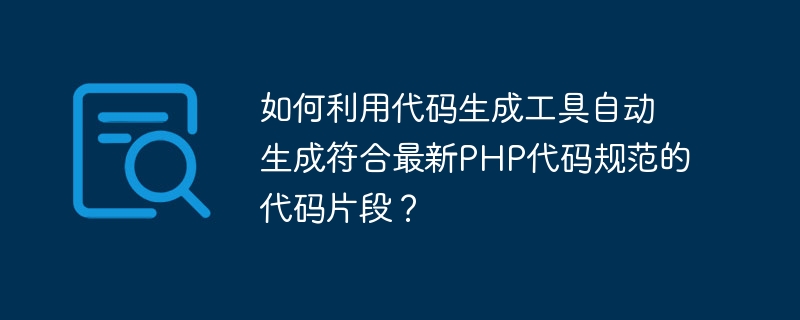

How to use code generation tools to automatically generate code snippets that comply with the latest PHP code specifications?
When writing PHP code, following consistent code specifications is very important for the readability and maintainability of the code. However, manually writing code snippets that comply with the latest PHP coding specifications can be tedious and time-consuming. To solve this problem, we can use code generation tools to automatically generate code snippets that comply with the latest PHP code specifications.
The following introduces a commonly used code generation tool - "PHP Coding Standards Fixer" (referred to as PHP-CS-Fixer), which can automatically fix standard issues in PHP code based on a set of preset rules. .
First, we need to install and configure PHP-CS-Fixer. Run the following command in the command line to install it:
composer global require friendsofphp/php-cs-fixer
After the installation is complete, we also need to add the installation directory to the system's environment variables so that PHP-CS-Fixer can be run in any directory.
Next, we can use the following command to check the specification issues in the code:
php-cs-fixer fix src/
This command will traverse all PHP files in thesrc/directory, and based on Preset rules to fix specification issues in your code. The repaired code will directly overwrite the original file, so it is recommended to back up the code before running this command.
In addition to manually running commands to fix the entire project's code, we can also customize the rules by editing the configuration file. Create a file named.php_cs.distin the root directory of the project and fill in the following content:
exclude('vendor') ->in(__DIR__); return PhpCsFixerConfig::create() ->setRules([ '@PSR12' => true, 'trailing_comma_in_multiline' => true, // 其他规则... ]) ->setFinder($finder);
In this configuration file, we use$finderDefine the folders and files that need to be checked, exclude thevendordirectory through theexcludemethod, and then use thePhpCsFixerConfig::createmethod to create the configuration object, And use thesetRulesmethod to define a set of rules.
In thesetRulesmethod, the@PSR12rule is set totrue, indicating that the latest PSR-12 code specification is used. In addition, other rules can be customized, such as thetrailing_comma_in_multilinerule, which adds commas to multiline arrays and parameter lists.
After the configuration file is ready, we only need to run the following command to check and repair the code:
php-cs-fixer fix
This command will automatically find and repair all PHP files in the current directory.
Of course, if we only want to repair a specific file, we can add the path to the file after the command:
php-cs-fixer fix path/to/file.php
It should be noted that you should be cautious when using automatic repair tools operate. It is recommended to back up the code first and conduct a detailed code review after repair to ensure that the repair results are as expected.
To summarize, using code generation tools to automatically generate code snippets that comply with the latest PHP code specifications can improve the readability and maintainability of the code. By installing and configuring PHP-CS-Fixer, we can customize the rules and automatically generate code that conforms to the specification. Of course, when using automatic generation tools, manual review and verification are still required to ensure that the repair results meet expectations.
The above is the detailed content of How to use code generation tools to automatically generate code snippets that comply with the latest PHP code specifications?. For more information, please follow other related articles on the PHP Chinese website!
 What are the seven principles of PHP code specifications?
What are the seven principles of PHP code specifications? pscs5 installation serial number
pscs5 installation serial number Win10 does not support the disk layout solution of Uefi firmware
Win10 does not support the disk layout solution of Uefi firmware SVN ignores file settings
SVN ignores file settings How to solve the problem of dns server not responding
How to solve the problem of dns server not responding How to open mds file
How to open mds file Standby shortcut key
Standby shortcut key How to recover accidentally deleted files
How to recover accidentally deleted files